-
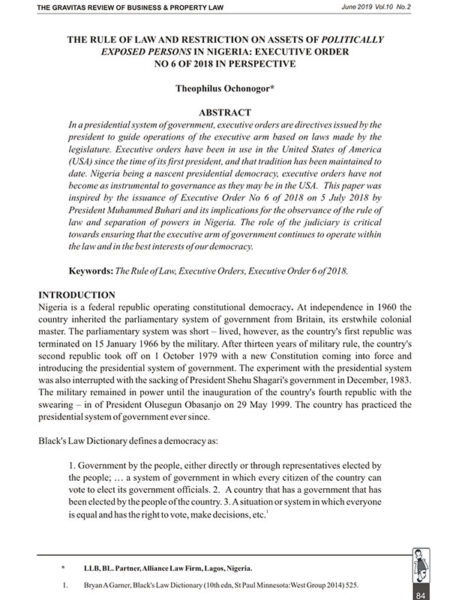
The Rule of Law and Restriction on Assets of Politically Exposed Persons in Nigeria: Executive Order No.6 of 2018 in Perspective
0₦2,500.00Theophilus Ochonogor, Partner, Alliance Law Firm, Lagos Nigeria in The Rule of Law and Restriction on Assets of Politically Exposed Persons in Nigeria: Executive Order No. 6 of 2018 in Perspective, reviews the constitutionality of Executive Orders (EO) generally, and EO6 specifically. Theophilus explores the jurisprudential history of Executive Orders, relevant cases on the issue, and argues that EO6 which empowers the Attorney General to preserve and protect from dissipation the assets of current or former government officials, or any politically exposed person is arbitrary, an usurpation of judicial powers, and an assault on the country’s constitutional democracy.
-
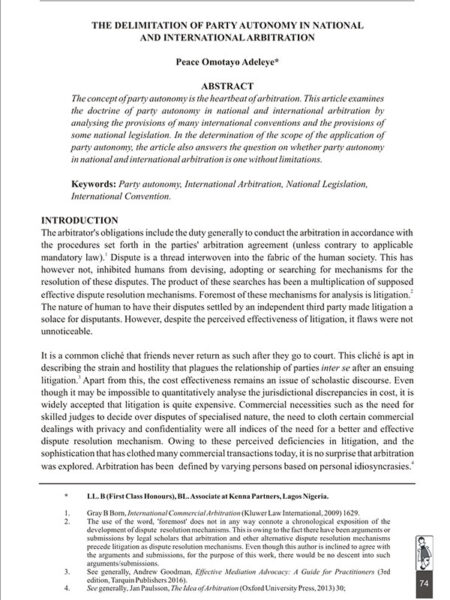
The Delimitation of Party Autonomy in National and International Arbitration
0₦2,500.00Peace Adeleye, Associate at Kenna Partners, Lagos Nigeria in her paper, The Delimitation of Party Autonomy in National and International Arbitrations, posits that the principle of party autonomy, the freedom of parties to a contract/arbitration agreement to make rules that govern them without the need for an intervention of a third party, is the soul and heart of arbitration. Adeleye comprehensively reviews national and international legislation enabling party autonomy and argues that much as parties to an arbitration agreement may want their freedom to contract to be limitless, there are indeed limits to the freedom. She discusses the limits of party autonomy in national and international arbitrations.
-
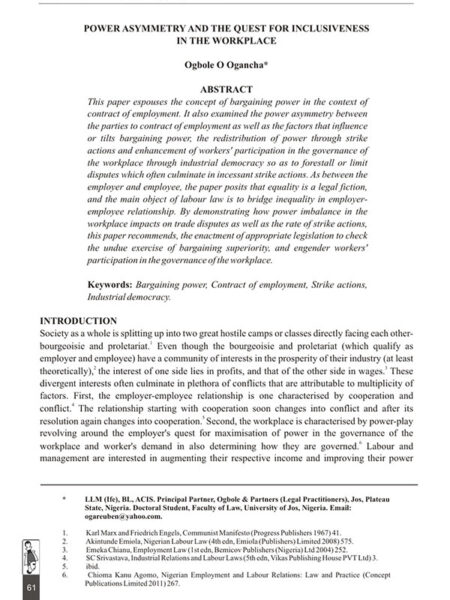
Power Asymmetry and the Quest for Inclusiveness in the Workplace
0₦2,500.00Ogbole Ogancha of Ogbole & Partners and Doctoral Candidate, Faculty of Law, University of Jos Nigeria inPower Asymmetry and the Quest for Inclusiveness in the Workplace, examines the concept of bargaining power in the context of the contract of employment. He considers the power imbalance between the parties to a contract of employment as well as the factors that influence or tilts bargaining power, the redistribution of power through strike actions and enhancement of workers’ participation in the governance of the workplace. Ogbole argues that equality in labour relations is a legal fiction, and the main object of labour law is to bridge inequality in the employer-employee relationship. Aside from demonstrating how power imbalance in the workplace impacts on trade disputes as well as the rate of strike actions, he recommends the enactment of appropriate legislation to check the undue exercise of bargaining superiority to engender workers’ participation in the governance of the workplace.
-
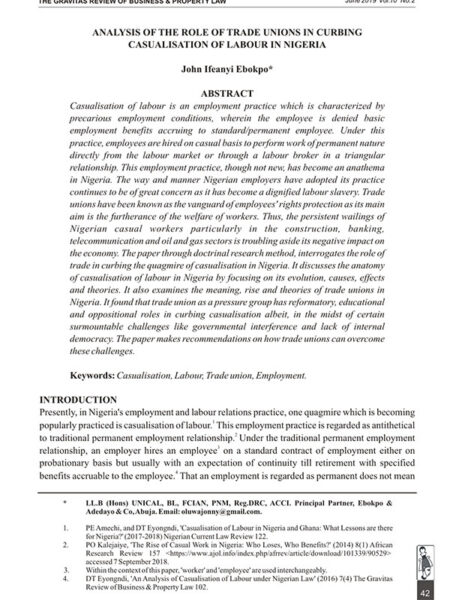
Analysis of the Role of Trade Unions in Curbing Casualisation of Labour in Nigeria
0₦2,500.00John Ebokpo in his article, Analysis of the Role of Trade Unions in Curbing Casualisation of Labour in Nigeria, examines the categories, framework, causes and effects of casualisation of labour. He considers how the reformatory, educational and oppositional roles of trade unions may curb the blight despite the unions’ lack of internal democracy and government interference in their affairs.
-
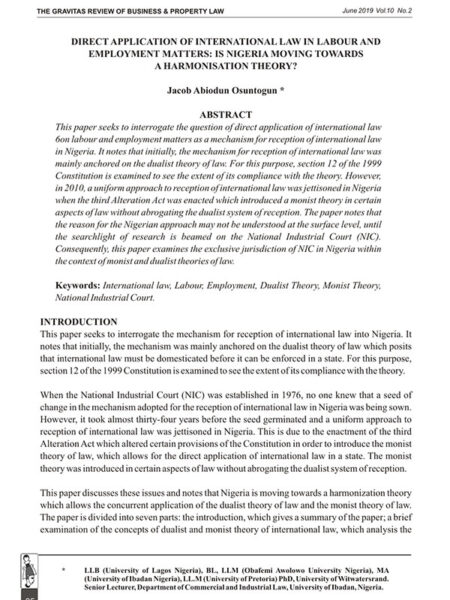
Direct Application of International Law in Labour and Employment Matters: Is Nigeria Moving Towards a Harmonisation Theory?
0₦2,500.00Dr Jacob Osuntogun, Senior Lecturer, Department of Commercial and Industrial Law, University of Ibadan Nigeria in his article, Direct Application of International Law in Labour and Employment Matters: Is Nigeria Moving Towards a Harmonisation Theory? interrogates the issue of direct application of international law in labour and employment matters in Nigeria. Ordinarily, unless international treaties and conventions are domesticated in accordance with section 12 of the 1999 Constitution, they are not applicable in Nigeria. However, section 254C (2) of the Constitution Third Alteration Act 2010 seems to have introduced a monist approach which allows a direct application of international law in labour and employment matters without abrogating the dualist system of reception of international law. Dr Osuntogun examines the dualist and monist controversy and the emergent harmonisation theory within the context of the exclusive jurisdiction of the National Industrial Court.
-
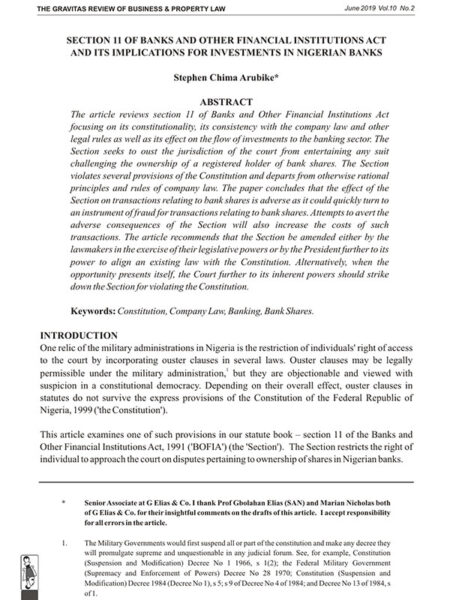
Section 11 of Banks and Other Financial Institutions Act and Its Implications for Investments in Nigerian Banks
0₦2,500.00Stephen Arubike, Senior Associate at G Elias & Co., Lagos Nigeria in his article, Section 11 of Banks and Other Financial Institutions Act and its implications for Investments in Nigerian Banks, examines the implication of section 11 BOFIA which ousts the jurisdiction of the courts in any suit challenging the ownership of a registered holder of bank shares. Stephen considers several decided cases and scholarly on the concludes that the section violates several provisions of the 1999 Constitution of Nigeria and departs from rational principles and rules of company law. He concludes that the section could have negative consequences on dealings and transactions in bank shares and ought to be struck down by the courts or amended by the parliament.
-
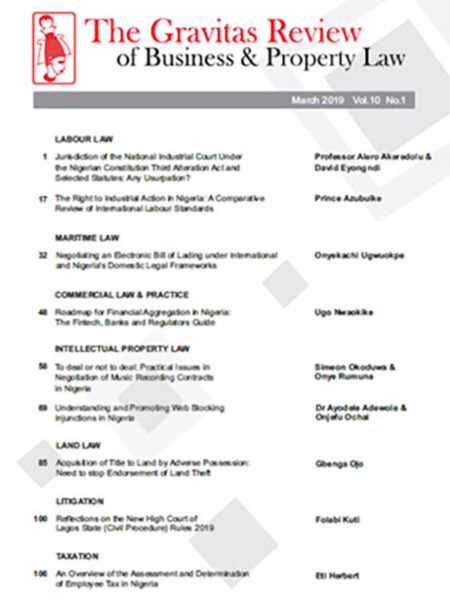
The Gravitas Review of Business & Property Law Vol.10 No.1 – Print
0₦5,000.00In this issue of The Gravitas Review of Business & Property Law Vol.10 No.1, there are well researched articles on:
- Labour Law
- Maritime Law
- Commercial Law & Practice
- Intellectual Property Law
- Land Law
- Litigation Practice & Procedure
- Taxation
-

The Gravitas Review of Business & Property Law Vol.10 No.1 – E-Book
0₦5,000.00In this issue of The Gravitas Review of Business & Property Law Vol.10 No.1, there are well researched articles on:
- Labour Law
- Maritime Law
- Commercial Law & Practice
- Intellectual Property Law
- Land Law
- Litigation Practice & Procedure
- Taxation
-

The Gravitas Review of Business & Property Law Vol.10 No.1
0₦5,000.00In this issue of The Gravitas Review of Business & Property Law Vol.10 No.1, there are well researched articles on:
- Labour Law
- Maritime Law
- Commercial Law & Practice
- Intellectual Property Law
- Land Law
- Litigation Practice & Procedure
- Taxation
-
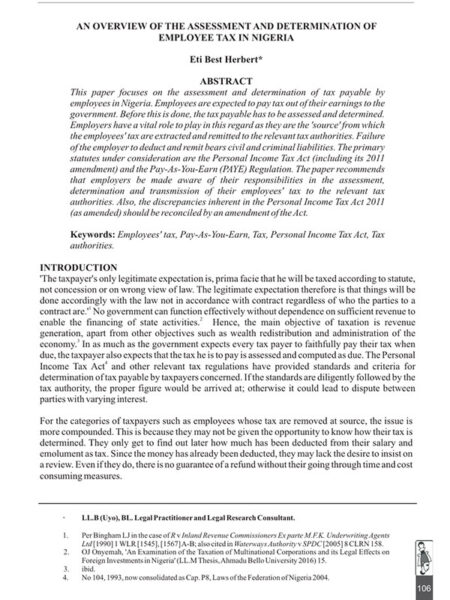
An Overview of the Assessment and Determination of Employee Tax in Nigeria
0₦2,500.00Eti Herbert, Legal Practitioner and Researcher in his article, An Overview of the Assessment and Determination of Employee Tax in Nigeria, examines the provision of the Personal Income Tax Act (PITA)and other relevant laws on the assessment and determination of employee tax in Nigeria; what is chargeable to tax; the implementation of the Pay-As-You-Earn (PAYE) system and, reliefs and deductions. He highlights inconsistencies and inadequacies in the provisions of PITA and other existing laws and recommends a review of the laws.
-
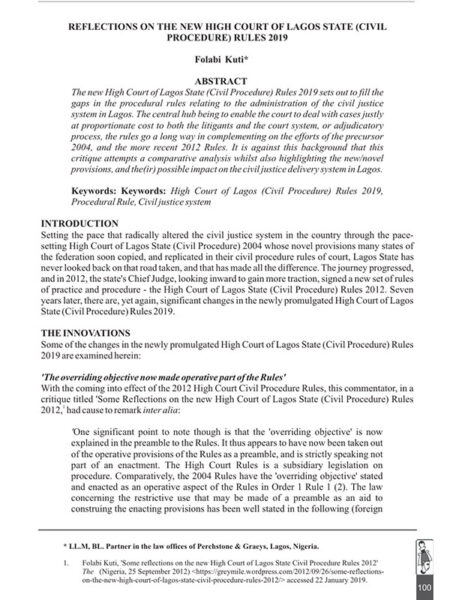
Reflections on the New High Court of Lagos State (Civil Procedure) Rules 2019
0₦2,500.00Folabi Kuti, Partner, Perchstone & Graeys Lagos Nigeria in Reflections on the New High Court of Lagos State (Civil Procedure) Rules 2019, undertakes a comparative analysis of the Civil Procedure Rules of 2012 and 2019, highlighting the novel changes in the new Rules and the likely impact on the civil justice delivery system in Lagos State.
-
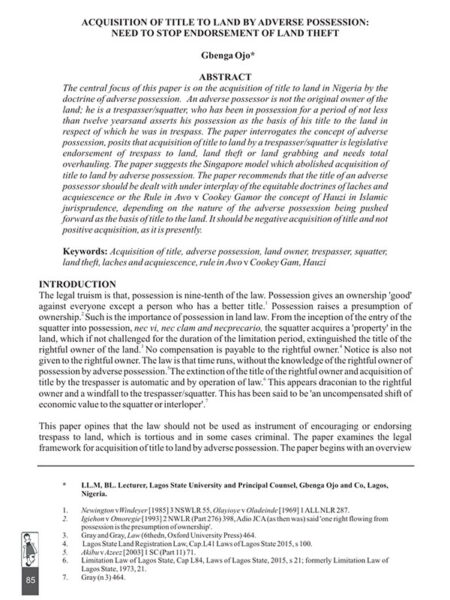
Acquisition of Title to Land by Adverse Possession: Need to Stop Endorsement of Land Theft
0₦2,500.00Gbenga Ojo, Lagos State University and Principal Gbenga Ojo and Co Lagos Nigeria in his article, Acquisition of Title to Land by Adverse Possession: Need to Stop Endorsement of Land Theft, interrogates the concept of adverse possession in land law. He posits that acquisition of title to land by a trespasser/squatter by adverse possession is tantamount to land theft. He argues that the claim of an adverse possessor rather than being dealt with under limitation laws should be taken care of by an interplay of the equitable doctrines of laches and acquiescence or the Rule in Awo v Cookey. He recommends a reform of the law and the adoption of the Singaporean model which abolished acquisition of title to land by adverse possession.
The Gravitas Review of Business & Property Law



